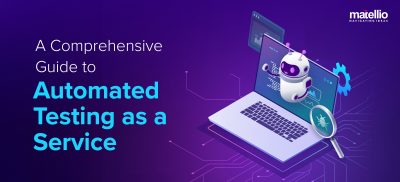
Digital transforming services are transforming every business in today’s quick-paced world, and the legal industry is no different. The days of legal firms operating exclusively conventionally and handling all their cases are long gone. It’s becoming increasingly apparent for law firms to use legal technology trends to remain prosperous and competitive.
In this blog, we’ll look at the many reasons why the legal sector has to adopt new technological trends and how technology trends in the legal industry could affect client interactions, business processes, and overall performance.
So, let’s get started!
Why Do Legal Technology Trends Matter So Much in the Legal Sector?
How legal businesses has been dramatically changed by technologies, particularly cloud-based platforms, AI development services, and many more.
 Automating Efficiency
Automating Efficiency
The legal sector is accustomed to processing enormous paperwork, research, and documentation. Custom enterprise solutions with technological advancements have helped attorneys to streamline their procedures and increase productivity. Document management systems with AI capabilities can hasten contract review procedures, freeing up attorneys to concentrate on more challenging jobs and offer their customers more excellent service.
 Advancement of Research Capabilities
Advancement of Research Capabilities
Research is essential for building a solid case or creating competitive tactics in the legal sphere. Technology trends in the legal industry have allowed attorneys to access massive databases, legal documents, and old case files swiftly and conveniently. Artificial intelligence (AI)-powered research tools can quickly evaluate data, presenting insights and precedents often needing days or weeks to obtain.
 Strengthening Data Privacy and Security
Strengthening Data Privacy and Security
As technology develops, new challenges related to data security and privacy emerge. The legal industry is susceptible to cyber assaults since private and sensitive data is handled often in this industry. Robust security procedures like multi-factor authentication and encryption have been developed due to technical improvements to safeguard client data. In 2023, being up to date with legal technology will help law firms stay at the forefront of data security.
 Predictive Analytics
Predictive Analytics
In the legal industry, predictive analytics has changed the game’s rules. AI-driven legal software development can predict court decisions, case developments, and possible risks by analyzing enormous volumes of data. This is all made simple by making educated judgments, creating more robust plans, and establishing realistic expectations for customers. In the legal industry, predictive analytics is utilized to assist attorneys in being more proactive, which improves their reputation and likelihood of success.
Key Legal Technology Trends Influencing the Legal Industry!
Technology is significantly impacting how the legal environment will develop in the future. The legal industry is being greatly affected by several significant technological trends:
Artificial Intelligence (AI) and Machine Learning
The legal sector has significantly benefited from AI and machine learning, which have dramatically sped up activities that formerly needed hours of manual labor. Legal practitioners can now analyze enormous volumes of data, spot trends, and derive insights thanks to these trends in legal technology, which improves the efficiency of legal research and document review. Additionally, AI-driven chatbots are revolutionizing client communication and service in legal offices.
Benefits
- Improved document screening and analysis procedures.
- Improved case result prediction accuracy.
- Savings in time and money for data processing and legal research.
Use Case
- To ensure compliance and reduce risks for their clients, attorneys can evaluate complicated legal agreements and discover crucial sections using AI-driven contract analysis software. If you want to leverage the benefits of AI-based legal software in your business, consult with a top AI development company like matellio.
Blockchain Technology
Known for being safe and transparent, blockchain technology is transforming several elements of the legal industry. Smart contracts are gaining popularity because they streamline contract administration and eliminate the need for intermediaries by automatically executing when specific criteria are satisfied. Blockchain-based legal software development also improves the security and integrity of legal records and papers.
Benefits
- Increased confidence and security in legal dealings.
- Less dependency on intermediaries of other parties.
- Immutable and auditable records for legal documentation.
Use Case
- Blockchain-based smart contracts for real estate transactions do away with the need for intermediaries and guarantee quick, safe, and untouchable property transfers.
Read More: Enhance your legal practice with tailored legal software development services for increased efficiency and client satisfaction.
Legal Analytics
Using previous case data and data-driven insights, legal analytics gives lawyers a competitive edge. By examining prior judgments and outcomes, attorneys can more properly assess case strategy and make educated decisions. Attorneys can more precisely identify patterns, evaluate risks, and project possible outcomes by using legal analytics enterprise solutions.
Benefits
- Data-driven decision-making for case strategy.
- Better risk assessment and client counseling.
- Improved productivity and efficiency in legal proceedings.
Use Case
- Legal analytics software help attorneys create strong and winning arguments by determining the likelihood that particular ideas will succeed or fail in court situations.
Cloud Computing
The legal sector quickly embraces cloud computing, which provides safe storage, simple access, and seamless collaboration on legal documents. Cloud-based enterprise solutions improve remote work capabilities and client communication by allowing attorneys to access case files, contracts, and other documents from anywhere.
Benefits
- Cooperation and data accessibility improvements.
- Improved data backup and catastrophe recovery.
- Enhanced capabilities for working remotely.
Use Case
- Cloud-based legal practice management software enables legal teams to work effectively together on cases, securely share information, and handle deadlines.
VR & AR
Experiences in courts and legal education are being revolutionized by virtual reality and augmented reality. With virtual reality (VR) technology, attorneys can design immersive simulations for case presentations and jury trials that convey complicated evidence more transparently and appealingly. By providing interactive learning opportunities, AR is also changing legal education.
Benefits
- Improved argumentation and trial appearances.
- Law students benefit from realistic and participatory legal teaching.
- Enhanced comprehension of accident and criminal scene reconstructions.
Use Case
- VR can replicate accident scenes in personal injury trials, giving jurors and judges a more realistic understanding of the circumstances that led to the incident.
Cybersecurity Solutions
Strong cybersecurity measures are necessary to protect against cyber-attacks and data breaches since the legal sector significantly depends on sensitive client information. Modern cybersecurity enterprise solutions safeguard private information from illegal access and ensure data protection laws are followed.
Benefits
- Protection of customer information and private data.
- Legal and financial risk reduction.
- Increased client reputation and confidence.
Use Case
- Law firms utilize encryption and multi-factor authentication to protect client communications and stop unwanted access to private information.
Internet of Things (IoT) for Legal Investigations
New data collection and analysis opportunities pertinent to legal investigations have emerged thanks to the Internet of Things (IoT). IoT devices, like wearables and smart home gadgets, can offer substantial evidence in various situations, including personal injury lawsuits and criminal investigations.
Benefits
- Improved data gathering for judicial investigations.
- Increased objectivity and accuracy in the presentation of the evidence.
- Improved efficiency in resolving cases.
Use Case
- Information from a smart wearable device can shed light on the claimant’s physical activity and health both before and after the occurrence of a personal injury lawsuit.
Also Read: IoT Consulting Services: Everything You Need to Know
Data Privacy and Compliance Solutions
Due to the growing emphasis on data privacy and protection, law firms are implementing data privacy and compliance solutions to guarantee compliance with pertinent laws like the GDPR and CCPA. These enterprise solutions help with responsible client data management and mitigating legal risk.
Benefits
- Conformity with data privacy laws.
- Reduced likelihood of data breaches and penalties.
- Increased client trust and reputation.
Use Case
- Law firms utilize data privacy solutions to handle and safeguard client data in compliance with specific legal requirements.
Virtual Law Firms
Modern solutions for legal practitioners seeking more flexibility and cost-effectiveness include virtual law firms. The businesses function remotely, enabling attorneys to work from anywhere, cutting administrative expenses, and offering more easily available legal services.
Benefits
- More excellent balance between work and life for legal practitioners.
- Lower operating expenses for legal firms.
- Increased availability of legal services.
Use Case
- By providing legal counsel and services without regard to location, virtual law firms serve customers worldwide.
Also Read: How to Develop Custom Legal Software?
Video Conferencing and Remote Depositions
The widespread usage of video conferencing technology has changed how legal practitioners conduct meetings, depositions, and hearings. Video conferencing makes Remote cooperation possible, which lowers travel costs and saves time while maintaining clear communication.
Benefits
- Reduced travel costs and time.
- Efficient remote client consultations.
- Greater flexibility in scheduling meetings.
Use Case
- Video conferencing is particularly helpful for depositing witnesses and experts spread out throughout the country.
Predictive Analytics for Case Outcome
Predictive analytics uses past case data to predict the likely result of ongoing cases. Lawyers can more accurately analyze the risks and create successful strategies for their clients by researching prior verdicts and legal precedents.
Benefits
- Improved case assessment and strategy development.
- Increased success rate in litigations.
- Better client communication and expectations management.
Use Case
- Predictive analytics can help defense lawyers in criminal cases assess the likelihood of specific verdicts and make appropriate preparations.
Mobile Apps for Legal Services
Mobile apps are revolutionizing the delivery and availability of legal services. With the help of these applications, customers can communicate with their attorneys, share documents, and obtain legal information quickly, improving the accessibility and convenience of legal services.
Benefits
- Increased accessibility and responsiveness to clients.
- Seamless document sharing and updates.
- Enhanced client satisfaction and loyalty.
Use Case
- Clients can book meetings, check case updates, and safely submit documents using a mobile app for law business with their legal team.
Conclusion
The adoption of numerous technical breakthroughs has considerably impacted the legal sector. These technologies, ranging from virtual law offices to legal research powered by AI, are changing how legal services are delivered and experienced.
Utilizing these technologies boosts productivity and efficiency while enhancing client engagement and pleasure. In order to remain competitive and offer customers the best quality of service, the legal industry must adjust and take advantage of these opportunities as technology develops.
 Automating Efficiency
Automating Efficiency Advancement of Research Capabilities
Advancement of Research Capabilities Strengthening Data Privacy and Security
Strengthening Data Privacy and Security Predictive Analytics
Predictive Analytics




